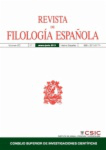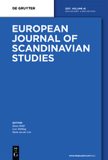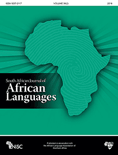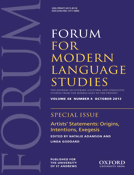
Sibirskii Filologicheskii Zhurnal
Scope & Guideline
Bridging Cultures Through Language and Literature
Introduction
Aims and Scopes
- Linguistic Analysis and Description:
The journal covers diverse linguistic studies, including phonetics, syntax, morphology, and semantics, often focusing on lesser-studied languages and dialects, particularly those of Siberia and surrounding regions. - Literary Studies and Criticism:
It publishes critical analyses of literary works, exploring themes, genres, and narrative techniques within Russian and Siberian literature, often linking them to broader cultural and historical contexts. - Folklore and Cultural Studies:
The journal highlights the significance of folklore in understanding cultural identities, focusing on the oral traditions, myths, and rituals of Siberian indigenous peoples. - Interdisciplinary Approaches:
It encourages interdisciplinary research, merging linguistics, literary studies, cultural history, and ethnography to provide deeper insights into the connections between language, literature, and society. - Historical Linguistics:
The journal engages with historical linguistics, examining language evolution, etymology, and the socio-historical contexts that shape linguistic changes over time.
Trending and Emerging
- Indigenous Languages and Cultures:
There is a growing focus on the languages and cultures of Siberian indigenous peoples, reflecting a commitment to preserving and understanding these unique linguistic heritages in the face of globalization. - Digital Humanities and Technology in Literature:
Emerging studies incorporating digital humanities methods, such as text analysis and digital archiving of Siberian literature and folklore, indicate a trend towards modernizing research approaches. - Gender and Cultural Studies:
Research exploring gender dynamics within literature and folklore has gained traction, showcasing how gender influences narrative structures and cultural expressions in Siberian contexts. - Intertextuality and Adaptation Studies:
An increase in studies analyzing intertextual relationships among texts, particularly in the context of adaptations, reflects a contemporary interest in how narratives evolve across different mediums. - Linguistic Landscapes and Sociolinguistics:
The journal is increasingly publishing works that examine the sociolinguistic aspects of language use in Siberia, including language contact, code-switching, and the impact of socio-political changes on linguistic practices.
Declining or Waning
- Traditional Literary Canon Studies:
There has been a noticeable decrease in studies focused solely on the traditional literary canon, particularly works by canonical authors like Pushkin and Dostoevsky, as newer research emphasizes contemporary literature and marginalized voices. - General Linguistic Theory:
Papers that engage with broad theoretical frameworks of linguistics, without a specific focus on regional or cultural contexts, appear to have diminished, reflecting a trend toward more localized and contextually rich studies. - Comparative Literature:
While comparative studies were once a staple, the journal's recent publications indicate a shift towards more specific, culturally embedded analyses rather than broad comparisons across different literary traditions.
Similar Journals

Fontes Linguae Vasconum
Exploring the Depths of Language HeritageFontes Linguae Vasconum, published by GOV NAVARRA, DEPT CULT SPORT & YOUTH DIR GENERAL CULT-INST PRIN VIANA, stands as a pivotal academic resource in the field of Linguistics and Language studies. Established as an Open Access journal since 2007, it ensures wide dissemination of research findings and promotes collaborative dialogue among scholars, researchers, and students. With a growing impact factor reflected in its Q2 category ranking in Linguistics and Language for the year 2023 and an impressive standing in Scopus with a rank of #443 in Arts and Humanities, the journal serves as a significant platform for advancing knowledge derived from the rich linguistic heritage of the Basque language and beyond. The journal is dedicated to publishing high-quality research articles, reviews, and discussion pieces that explore diverse aspects of language, fostering connections between contemporary linguistic theories and their practical implications. Based in Pamplona, Navarra, Spain, Fontes Linguae Vasconum continues to evolve, providing researchers and academics with essential insights and a valuable reference in the vibrant field of linguistics.

Folia Linguistica et Litteraria
Innovating Research in Language and Literary StudiesFolia Linguistica et Litteraria, published by the University of Montenegro's Institute of Language and Literature, is an esteemed academic journal that provides a vital platform for the exploration and discourse in the fields of Linguistics and Literary Theory. With an ISSN of 1800-8542, this journal serves as a significant resource for researchers, educators, and students alike, fostering an understanding of language, literature, and their interrelationship. Having established its presence in the scholarly community, Folia Linguistica et Litteraria has been ranked in the 2023 quartiles, achieving Q3 in Linguistics and Language, and Q2 in Literature and Literary Theory, indicating its growing influence and relevance. Its Scopus rankings further underscore the journal’s commitment to high-quality research, reflecting its standing within the arts and social sciences. While the journal operates without open access, its rigorous peer-review process ensures that only the most impactful studies are published. As it converges its focus from 2019 to 2024, this journal invites contributions that challenge conventional boundaries, encouraging interdisciplinary dialogue and innovative research in the rich fields of linguistics and literary studies.

REVISTA DE FILOLOGIA ESPANOLA
Exploring the Depths of Spanish Linguistics and LiteratureREVISTA DE FILOLOGIA ESPANOLA is a distinguished academic journal dedicated to the fields of linguistics and literature, published by the CONSEJO SUPERIOR INVESTIGACIONES CIENTIFICAS (CSIC) since 1954, and has been an Open Access journal since its inception. Situated in Madrid, Spain, this journal has emerged as a crucial platform for the dissemination of scholarly research, with notable rankings including Q2 in Linguistics and Language and Q1 in Literature and Literary Theory as of 2023. The journal's commitment to fostering academic dialogue is reflected in its impressive Scopus rankings, including a 79th percentile in the Arts and Humanities for Literature and Literary Theory. Covering a wide range of topics from linguistic theory to literary critique, REVISTA DE FILOLOGIA ESPANOLA is essential reading for researchers, professionals, and students alike, providing valuable insights and cutting-edge research in the ever-evolving landscape of Spanish philology.

LINGUA E STILE
Advancing Scholarly Discourse in Linguistics and LiteratureLINGUA E STILE, published by SOC ED IL MULINO, is a distinguished academic journal based in Italy that delves into the intricate realms of linguistics, literature, and philosophy. With an ISSN of 0024-385X, this journal has been a vital platform for scholarly discourse since its inception, covering a broad spectrum of topics from linguistic theory to literary analysis. Although it currently holds a Q4 category ranking in 2023 across multiple disciplines—specifically in Linguistics and Language, Literature and Literary Theory, and Philosophy—it remains committed to fostering insightful contributions that challenge and expand conventional understanding in these fields. While it does not offer open access, the journal diligently focuses on publishing high-quality research that appeals to academics, professionals, and students alike. With the convergence of multi-disciplinary approaches, LINGUA E STILE is positioned to engage with contemporary debates and developments, enriching the academic landscape from its base in Bologna, Italy, and inviting contributions that exemplify the evolving intersections of language and thought.

Cadernos de Letras da UFF
Innovating Literary Studies with Open Access ScholarshipCadernos de Letras da UFF is a prominent academic journal published by the Department of History at the Federal University of Fluminense in Brazil. Since its transition to Open Access in 2014, it has fostered a spirit of collaboration and dissemination in the field of Literature and Linguistics, welcoming contributions that explore various aspects of literary studies, historical literature contexts, and linguistic phenomena. With a commitment to quality and academic rigor, the journal serves as a vital resource for scholars, practitioners, and students engaged in the humanities. The journal is dedicated to the advancement of knowledge through innovative research and critical analyses, making it an essential platform for sharing ideas with a global audience. The journal is based in Niterói, RJ, Brazil, and is indexed in various academic databases, enhancing its visibility and impact within the scholarly community.

European Journal of Scandinavian Studies
Illuminating linguistic diversity and literary depth.European Journal of Scandinavian Studies is an esteemed journal published by Walter de Gruyter GmbH, dedicated to advancing scholarship in the fields of Cultural Studies, Linguistics and Language, and Literature and Literary Theory. Since its inception in 2010, the journal has been a pivotal platform for researchers and scholars, showcasing cutting-edge research and critical discussions pertaining to Scandinavian languages and cultures. With an ISSN of 2191-9399 and an E-ISSN of 2191-9402, the journal emphasizes accessibility to impactful academic work, despite its current non-open access model. While the journal is categorized within the Q4 quartile for Cultural Studies and Linguistics/Language, it has shown notable potential in ranking higher in its specialized domains, fostering a growing community of researchers invested in Scandinavian studies. The journal's office is located in Berlin, Germany, further enriching its European scholarly context. As it continues to evolve, the European Journal of Scandinavian Studies serves as a vital resource for academics seeking to engage deeply with the multifaceted aspects of Scandinavian culture and linguistics.

Acta Baltico-Slavica
Bridging Cultures: A Platform for Slavic Academic ExchangeActa Baltico-Slavica, an esteemed academic journal published by the Polish Academy of Sciences, Institute of Slavic Studies, serves as a vital platform for the exploration of Slavic cultures, languages, and historical narratives. Since its transition to Open Access in 2014, the journal has fostered inclusivity and accessibility, allowing researchers, professionals, and students to engage with cutting-edge scholarship in the fields of History, Linguistics and Language, and Literature and Literary Theory. With a commendable impact as indicated by its category quartile rankings (Q2 in History and Literature, Q3 in Linguistics), and Scopus rankings reflecting its significance within the academic community, Acta Baltico-Slavica not only contributes to the rich tapestry of scholarship surrounding the Baltic and Slavic regions but also encourages interdisciplinary dialogue. The journal’s commitment to advancing knowledge across its fields of study makes it a prominent destination for scholarly discourse and research inquiry.

South African Journal of African Languages
Advancing the discourse on African languages and literature.The South African Journal of African Languages, published by Routledge Journals, Taylor & Francis Ltd, is a premier academic resource dedicated to the advancement of research in the fields of linguistics, language, and literary theory. Since its inception in 1996, this journal has been pivotal in fostering scholarly discourse around African languages, contributing significantly to our understanding of cultural and linguistic diversity across the continent. With its impressive categorization in 2023 as Q2 in Linguistics and Language and Q1 in Literature and Literary Theory, the journal attracts high-quality research and innovative perspectives, positioning itself among the leading publications in the relevant academic arenas. Researchers and students alike will find valuable insights within its pages, as it consistently ranks in the top percentiles of Scopus, notably achieving an 81st percentile in Literature and Literary Theory. The journal is committed to enhancing accessibility to research, although it currently does not offer Open Access options. Its scope includes an array of topics related to language policy, linguistic preservation, and literary critique, making it an essential resource for those engaged in the rich tapestry of African linguistics and literature.

FORUM FOR MODERN LANGUAGE STUDIES
Empowering Voices in Modern Language StudiesFORUM FOR MODERN LANGUAGE STUDIES is a prestigious academic journal published by Oxford University Press that has been serving the fields of literature and linguistics since its inception in 1965. This journal, with an ISSN of 0015-8518 and an E-ISSN of 1471-6860, plays a crucial role in advancing scholarly discourse on modern language studies, including literature and literary theory. With an impactful presence in both the linguistic and literary domains, it has been recognized in 2023 with a category ranking of Q2 in Literature and Literary Theory and Q3 in Linguistics and Language. It stands out in the competitive landscape, holding a notable position within Scopus rankings, including a 70th percentile ranking in Literature & Literary Theory. While the journal currently does not offer open access options, it remains a vital resource for researchers, educators, and students passionate about the transformative power of language and literature. Its commitment to quality research and robust academic discussion underscores its importance, making it a key platform for those aiming to contribute to modern language scholarship.

Romanica Olomucensia
Bridging Disciplines for a Richer Academic ExperienceRomanica Olomucensia is a distinguished open-access academic journal published by Palacky University, Department of Romance Philosophical Faculty in the Czech Republic. With its commitment to fostering advanced research in the fields of Literature and Literary Theory as well as Linguistics and Language, this journal aims to provide a platform for scholars, researchers, and students to share their findings and insights. Since its inception, Romanica Olomucensia has consistently been recognized for its quality, securing a position in the Q2 category in the literature domain and achieving a Q3 ranking in linguistics per the 2023 category quartiles. The journal is indexed in Scopus, reflecting its standing in the academic community, with impressive ranks in various arts and humanities disciplines. It has been an open-access journal since 2018, promoting unrestricted access to all its publications, thus enhancing global academic outreach. With a focus on innovation and interdisciplinary studies, Romanica Olomucensia serves as an essential resource for anyone interested in the dynamic interplay of language and literature.